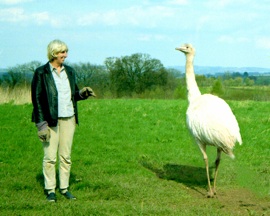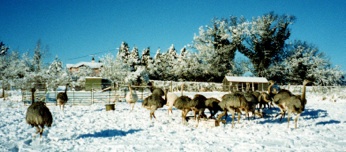Rheas on the Small Farm






Text


Rheas on the Small Farm
Rheas have only very recently begun to be farmed, almost entirely as yet in North America. Their homeland is the Pampas of Argentina, extending into Patagonia in the south. Thus, they come from temperate zones, and so they can thrive in the open in our climate. They look like small ostriches and they are very like ostriches in their behaviour and in the way you keep them. They are very hardy and disease-free.
Rheas are easier to get on with because they are smaller than you, whereas ostriches are bigger than you. You can keep them without the restrictions imposed by the Dangerous Wild Animals Act. They do not need to be housed in large and expensive buildings. When adult, they are not at risk from foxes.
These birds will live on such feeds as clover, alfalfa (which you can find in some horse feeds), flaked maize, ostrich or turkey compounds, layers’ pellets, waste cabbages, the tops of root crops, insects, earthworms, and other small animals, and the general forage from the land that they are on. They do eat grass, but they browse rather than graze. In their homeland they are accustomed to sparse vegetation and an extensive, wandering lifestyle. They also eat young thistles and docks which is useful! On the other hand, it is very important to feed the birds well in the breeding season (mid-February to end July) to ensure viable chicks. During that period ostrich breeders’ compound is readily available; alternatively, turkey and game bird feeds should be available.
The Rhea provides ultra low-fat red meat which is delicious to eat, the best of it being very like best fillet of steak. Its fat content is around 1% which is lower than for any other meat, and so it is good for people who have a problem with consuming other meats because of excess cholesterol in their blood.
Like Ostrich, rhea meat is classified within EU regulations as Farmed Game. It can be treated in many ways like tender beef to make standard dishes like Stroganoffs, stir-fries, and Steak Dianes. It is an extremely quick cook meat, and in fact cooking for much longer than two minutes or so on each side will tend to spoil it - it hardly needs cooking at all!
Here is a delicious snack recipe or serving suggestion that uses stir fry rhea (this works well with leg steak): Take some leg steak, slice it thinly, and then cut each slice into one-inch pieces. In a small quantity of hot (nearly smoking) olive oil on a high heat, stir fry the rhea with garlic and herbs for under two minutes, or until it is brown but not crisp. Transfer to a slower heat and stir in whisked seasoned eggs for scrambling, along with fried onions, mushrooms and peppers. When ready, serve on bread fried in a thin layer of olive oil.
The meat is to be regarded as a high quality product which can occupy a niche at the upper end of the market. With perseverance on the part of producers, the Rhea should become established as a new kind of farmed livestock because it answers to the current concerns for wholesomeness and welfare issues, as well as being well suited for rearing in this country. To this end, the Rhea and Emu Association has been set up with marketing and awareness-raising being among the main goals.
This is only the briefest introduction, but it may be enough to enable you to consider its merits as a suitable diversification for agriculture. It is worth remembering that even if you are not interested in farming this inquisitive, friendly, graceful, and rather endearing creature, it can make an attractive park animal, or simply be kept as a pet.
As pets you will find them responsive and quickly ready to eat out of your hand. They like to investigate your buttons and tug at your shoelaces! They make a fine sight stalking about in parkland, and in that setting the white variant can be an especially striking spectacle.
For further information on rearing and management, please email for an twentyone-page booklet at £10.00 sterling (including postage) based on my hard-earned experience - please make cheque payable to H. C. Macfie. If you have a PayPal account you can instead ask me to bill you for this amount.



